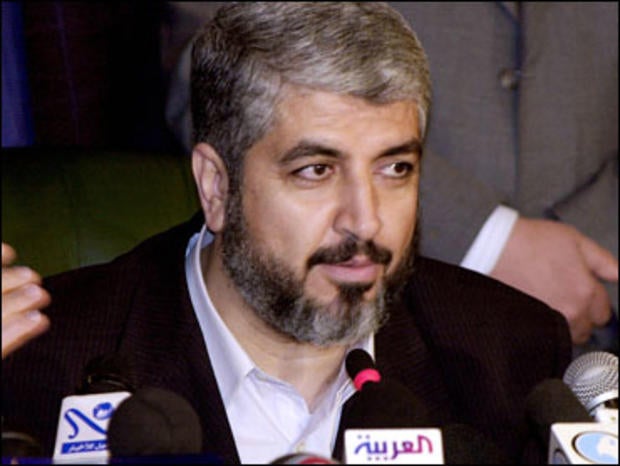Hamas and Fatah Agree to Reconcile
The Islamist movement Hamas and President Mahmoud Abbas's Fatah faction agreed - after a marathon meeting in Damascus that lasted until the early hours of Saturday - to narrow their differences and bring an end to their ongoing dispute.
A three-member Fatah delegation opened talks Friday night with Hamas political supremo Khaled Meshaal, who lives in exile in Syria, as part of efforts to reconcile.
Central Committee member Azzam al-Ahmad, Sakher Bseiso and Nasser Yousef arrived in Damascus Thursday a few days after Meshaal met in Saudi Arabia with Egyptian intelligence chief Omar Suleiman, who has been instrumental in past efforts.
"The meeting took place in a friendly and cordial atmosphere and a genuine will from both sides to end the rupture, where an agreement has been reached on the process and steps to be taken toward reconciliation," a joint political statement by the two groups said.
The statement, read by Meshaal's deputy Moussa Abu Marzouk, said several sticking points have been already solved.
"Both reviewed the points of disagreement that came in the Egyptian document and reached an understanding on many of them," the statement said, adding Hamas and Fatah had agreed to convene another meeting with the rest of the Palestinian groups "soon" to reach a final formula.
After that the Palestinian factions would head to Cairo to sign the reconciliation document and "consider the understandings [reached today] part and parcel of the reconciliation paper."
In the last general election in 2006 the militant Hamas group defeated the secular Fatah, headed by Palestinian president Mahmoud Abbas.
Tensions between the two came to a head the following year when Hamas forces in the Gaza Strip routed those loyal to Abbas's Palestinian Authority, confining the latter's authority to the Israeli-occupied West Bank.
Egypt has made several attempts at reconciliation, but the last round of talks ended in October 2009 when Hamas refused to sign an Egyptian document after it was inked by Fatah, fearing it could result in Fatah maintaining control over the official Palestinian security apparatus.
Under the terms of that document, legislative and presidential elections were to happen in mid-2010.
Relations between the two parties have become more complicated recently
after the Islamist Hamas roundly condemned Abbas for agreeing to resume direct peace talks with Israel, and promised to continue its armed struggle against the Jewish state, whose existence it does not recognize.
Israeli and Palestinian leaders met in Washington on Sept. 2, 2010, to discuss the permanent status issues, which are mainly settlement, borders, security, Jerusalem, refugees, water and prisoners.
After that, two rounds of talks, which were also sponsored by the United States, have been held in the Egyptian resort of Sharm el-Sheikh and Jerusalem. The talks have not led to any progress because of the two sides' differences over the settlement issue in the West Bank.
Hours before the Washington gathering, Hamas strongman in Gaza, Mahmoud
Zahar, said Abbas "has no right to represent Palestinian people."
This narrow strip on the Mediterranean is home to more than a million
Palestinians, none of whom is represented in the current round of
Palestinian-Israeli negotiations.
With Gaza rocket fire and Israeli air strikes providing a potent reminder of Hamas's potential to destabilize Israeli-Palestinian peace talks, U.S. envoy George Mitchell flew in Damascus last week and met with Syrian President Basher Al-Assad in the hope of securing broader regional support.
American diplomats have been to Damascus repeatedly over the past 18 months as part of a renewed attempt to engage with the Syrian leadership - a reversal of the policy of isolation practiced under George W. Bush.
Earlier this year President Barack Obama tapped Robert Ford to be the first U.S. ambassador to Syria in five years, although his nomination has yet to be been confirmed. U.S. Secretary of State Hillary Clinton was set to meet with Syria's Foreign Minister Walid Mouallem on Monday in New York on the sidelines of the U.N. General Assembly.
Last week in the region Clinton said the United States plans to involve
Syria and Lebanon in talks with Israel as part of its push toward the
"comprehensive" Middle East peace enshrined in the 2002 Arab peace initiative.
Syria has insisted that the promise of an Israeli withdrawal from the Golan Heights, a plateau seized by Israel from Syria in the 1967 Six-Day War, be a precursor to any renewed peace negotiations between the two countries.
Israeli Prime Minister Benjamin Netanyahu has vehemently rejected the notion of a withdrawal.
Clinton and Moualem met briefly in March 2009 on the sidelines of an
international donors' conference on rebuilding the Gaza strip after the
December 2008 Israeli offensive. They spoke by phone earlier this year about improving the U.S.-Syria bilateral relationship.
